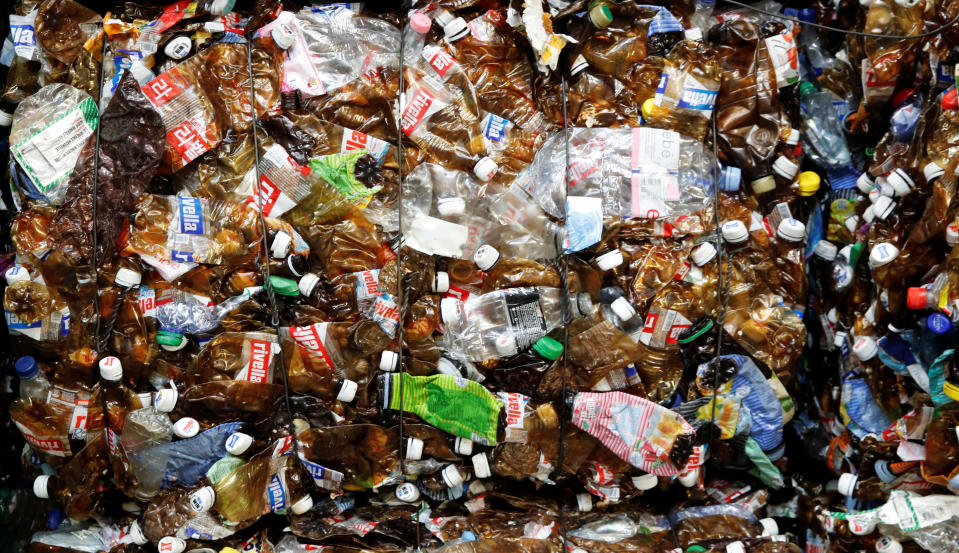Short seller Hindenburg says Loop Industries' recycling technology is 'fiction'
Short seller Hindenburg Research published a report Tuesday calling out plastics recycling company, Loop Industries, Inc. (LOOP), with claims that the company’s stated technology breakthroughs are “fiction.”
The 6-year-old recycling company has inked agreements with major food, beverage and beauty product manufacturers, including Coca-Cola (KO), PepsiCo (PEP), Evian (BN.PA), L’Oreal (OR.PA), and L'Occitane (0973.HK).
Hindenburg has taken a short position in the Montreal-based company, and according to its report, has submitted its findings to regulators.
Using information collected from former Loop employees, plastics experts, competitors, and company partners, Hindenburg alleges that the company’s technology is no more efficient or cost effective than traditional PET recycling methods, that it misrepresented its technology to investors, and produced false laboratory results from a company laboratory that was off limits to certain employees.

Hindenburg made headlines last month after it released a report accusing hydrogen fueled truck manufacturer, Nikola Corporation (NKLA), of fabricating its technology advancements.
‘Technically impossible’ and ‘industrially impossible’
New methods for revitalizing plastic are in demand, as low petroleum prices drive down the cost to use new PET resin, while recycling suppliers try to compete with poorer quality input materials. In 2018, approximately 360 million tons of plastic were produced.
“In the company’s June 15, 2016, annual report, it claimed to be breaking PET down into base chemicals at a recovery rate of ‘100%,’ Hindenburg wrote in its report. “We spoke to a former employee that worked at Loop around the time of this claim, who told us the claim of a 100% recovery was ‘technically impossible’ and ‘industrially impossible.’”
In a statement published Tuesday in response to Hindenburg’s report, Loop said, “Hindenburg Research has not engaged with Loop directly nor does Loop Industries believe Hindenburg Research has done the required due diligence for this report. The claims it makes are either unfounded, incorrect, or based on the first iteration of Loop's technology, known as Gen 1, which was in use between 2014 and 2017.”
The statement continued: “In 2017, Loop reinvented its process and developed its Gen 2 technology, which is at the core of Loop’s commercialization projects. Loop’s focus remains on commercializing its technology to meet growing global demand for infinitely recyclable PET plastic and polyester fiber made from 100% recycled content.”
According to Loop’s website, its mission is to “accelerate the world’s shift toward sustainable PET (polyethylene terephthalate) plastic and fiber,” a synthetic, petroleum-based material commonly used for bottled drinks, food containers, and textiles. Its claim to novel technology called “Infinite Loop” would allow for waste plastic that currently cannot be recycled to become fully upcycled into high quality PET.
“We believe our technology is at the forefront of the global transition away from fossil fuels and petrochemicals...where PET plastic and polyester fiber are produced from 100% recycled content,” the company said in its October 7 earnings report.
Hindenburg also claims Loop lacked scientific expertise, including at its top levels. The company’s sibling lead scientists, it says, lack any postgraduate education in chemistry. The short seller further accuses Loop CEO, Daniel Solomita, of pressuring employees to lie about the company’s technology and utilizing individuals who pleaded guilty to securities fraud to facilitate a seed capital investment.
Yahoo Finance requested Loop’s response to Hindenburg’s claims on Tuesday morning. As of the time this story was published, it had not yet received Loop’s response.
Shares of Loop were down 30% just after 8:30 a.m. on Tuesday morning after the release of the report.
Alexis Keenan is a legal reporter for Yahoo Finance and former litigation attorney.
Follow Alexis Keenan on Twitter @alexiskweed.
Read more:
‘Dangerous for democracy: Big tech hearing gives clues on future of antitrust law’
How Donald Trump and other real estate professionals get away with paying ‘zero tax’
Nikola could find itself in legal trouble if short seller claims are true
Labor Department proposes definition for independent contractors for the first time ever
Short seller rejects Nikola’s explanation as ‘tacit admission of securities fraud’
Follow Yahoo Finance on Twitter, Facebook, Instagram, Flipboard, SmartNews, LinkedIn, YouTube, and reddit.
Find live stock market quotes and the latest business and finance news

 Yahoo Finance
Yahoo Finance 